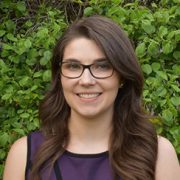Dr. Christina Reppucci, on passion for teaching and mentoring.
Interview by Katie Yoest, PhD
Katie Yoest – Tell us about your background and what led you to become a postdoc at Michigan State University.
Christina Reppucci – As an undergraduate at Gettysburg College I enrolled in Brain & Behavior as an elective for my biology major. I was instantly hooked —fascinated by the bidirectional interplay between the brain and behavior— declared a minor in neuroscience, and subsequently took nearly every neuroscience course my small, liberal arts college offered. After graduating, I went on to complete my masters and PhD in Behavioral Neuroscience at Boston College. But graduate school was tough, and by the end I wasn’t quite sure what I wanted to do next. Fortuitously, a member of my dissertation committee was looking for someone with my neuroanatomy skillset, and I was keen to learn the techniques she specialized in – so I joined her lab as a postdoc.
What was the reason to choose MSU to do your postdoc?
Shortly after joining Dr. Alexa Veenema’s Neurobiology of Social Behavior Lab, she received a job offer from MSU. Initially, I was crushed. During that short period of time in her lab, my love for science had been re-sparked, I was excited about our research projects, and most importantly we had a great working relationship. I was hesitant to move with her half-way across the country, far away from family and friends. But MSU looked like it could be a great place for me to continue my postdoc position– there were dozens of neuroscience labs, excellent core facilities, support for postdocs through the former Postdoctoral Office, and an active Postdoctoral Association. So, I helped pack up and move the lab from Boston to East Lansing.
Tell me about your current role; how did you decide to pursue this position?
I am currently a Visiting Assistant Professor of Neuroscience in the Psychology Department at Wheaton College in Massachusetts. My appointment is for teaching, but I have access to furnished research facilities that I plan to take fuller advantage of this summer (with some eager undergrads by my side!). I loved my small liberal arts education, and have always wanted to pay it forward by helping to inspire the next generation of scholars and scientists at a similar institution. My primary teaching responsibilities include the same classes that got me hooked on neuroscience, as well as my dream lab course that gives students hands-on experience in rodent behavioral neuroscience research. Completing my postdoc helped build up the research side of my CV and this position is helping me build up the teaching side of my CV, with the goal of securing a tenure track position in the future.
How did your postdoctoral experience prepare you for your current role?
As you would expect, a large part of my current position is teaching and mentoring undergraduate students. My postdoc PI was always enthusiastic about having undergraduates in the lab, and I supervised 8 students (including 2 theses) during my time in the lab. Mentoring undergraduates in the research lab was a highlight of my experience, and I received the 2021 Undergraduate Research Supervisor of the Year Award and the 2021 Postdoctoral Excellence in Mentoring and/or Teaching Award.
You were an active member of the PDA while at MSU, how did this shape your postdoctoral experience?
I joined the MSU-PDA shortly after arriving at MSU, at the urging of the former director of the old Postdoctoral Office, Dr. Tony Nunez. I saw it as an opportunity to potentially make some new friends, and meet fellow postdocs. I started as a member-at-large, before chairing the Communications & Digital Presence Committee, and later co-chairing the Steering Committee. As postdocs we often get stuck in this tiny little bubble with all our focus on our research commitments, and it was great to take a step outside of that bubble to assess and advocate for the needs of the postdoc community. It greatly impacted my postdoc experience, and highlighted the importance of service. If there are unmet needs for specific groups of folks or inequities in programs or institutions, serving on committees is an opportunity to help bring about actionable and meaningful change (no matter how small or how large).
What do you hope to achieve in the next year, in all aspects of life?
Submit a couple unfinished papers from my postdoc. Get back on the job market. Collect some data with students that they can present at regional conferences. Start a patio garden. Stay healthy. Travel.
To wrap it up, and to know more about you, tell me what comes to mind first in this rapid round of questions!
Favorite food – Anything cooked off the grill
Favorite way to spend a day off – Outside
Favorite holiday – Memorial Day
Favorite place you ever visited or lived – Visited – South Korea, I still dream about all the great food I ate when I was there.
Job you would do if it wasn’t research – Florist






